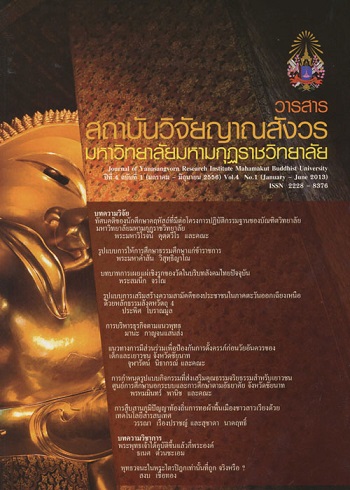A Model of Northeastern Thais’ unity Reinforcement through Sangahavatthu (Fourfold Principle of Kindly Treatment)
Main Article Content
Abstract
The research had been conducted with three objectives: 1) to seek for the method of their unity reinforcement through the above principle, 2) to compare their unity reinforcement model, resting upon differences in respondents’ genders, ages, careers, educational backgrounds, and their domiciles in each province and 3) to assess the model of their unity reinforcement through it. The underlying research hypothesis lay in that differences in their personal and supportive factors had differing models of their unity reinforcement. The research methodologies were the dichotomy between the survey research and the qualitative one by making use of the questionnaire forms distributed to 582 respondents and the formal interview ones for interviewing twenty-three subjects one by one. The statistical tools used for computing data included frequency, percentage, standard deviation, t-test and F-test (One-Way ANOVA) by setting the statistical significance at 0.05, while analyzing the qualitative data by way of content The research findings showed that their unity reinforcement through aforesaid principle was rated very good in the overall four aspects. Their opinions on the models of their unity reinforcement in the overall eight aspects were also scored very good. Additionally, there was contrasting correlation between differences in their genders, ages, educational backgrounds, domiciles and supportive factors and their unity reinforcement through the above principle in the overall eight aspects with the statistical significance at .05, whereas the qualitative data of their same career indicated that their unity reinforcement through the same principle had good and appropriate role models. As for the qualitative data, they were found that the above principle had the good and appropriate role model, in which it extended to giving things to others, sacrifice belongings to them, being generous with others and sharing things with others for their own benefits without selfishness; to speak pleasant or polite words in order to create a goodwill gesture culminating in loving and respecting one another, cooperating in doing work so as to bring about mighty strength in the groups and sharing responsible burdens and duties with them , including devoting their time to help the society or the public for the benefits of the nation; to make oneself steadily well towards others including the use of correct etiquettes following their positions, states, persons, circumstances suitable for them in the society; to steadily behave oneself towards others, render them equality, not take advantage of others, be well aware of others’ happiness and illness, realize others’ problems and together solve them for the benefits of the society.
Article Details
References
การศาสนา, กรม. ลานวัด ลานใจ ลานกีฬา. กรุงเทพมหานคร : โรงพิมพ์การศาสนา, 2544.
จุฑาทิพย์ ธีรภาค. “วิเคราะห์จริยธรรมในหนังสืออ่านนอกเวลา ระดับมัธยมศึกษา”. ปริญญานิพนธ์การศึกษามหาบัณฑิต. บัณฑิตวิทยาลัย : มหาวิทยาลัยศรีนครินทรวิโรฒ, 2539.
นิยดา สุวิชาวรพันธุ์. “ผลของการใช้สถานการณ์จำลองที่มีต่อความสามัคคีของนักเรียนชั้นประถมศึกษาปีที่ 6 โรงเรียนวัดราษณ์บำรุง กรุงเทพมหานคร”. ปริญญานิพนธ์การศึกษามหาบัณฑิต. บัณฑิตวิทยาลัย : มหาวิทยาลัยศรีนครินทรวิโรฒ, 2541.
พระนาวิน ถาวโร (ฉุนแสนดี). “รัฐศาสตร์แนวพุทธ : ศึกษาเฉพาะกรณีสังคหวัตถุ 4 กับนักการปกครอง”. วิทยานิพนธ์ศาสนศาสตรมหาบัณฑิต. บัณฑิตวิทยาลัย : มหาวิทยาลัยมหามกุฏราชวิทยาลัย, 2550.
สมเด็จพระมหาสมณเจ้า กรมพระยาวชิรญาญวโรรส. พุทธศาสนสุภาษิต. กรุงเทพมหานคร : โรงพิมพ์มหามกุฏราชวิทยาลัย, 2511.
สมหมาย บัวจันทร์, พันตรี. “การวิเคราะห์และยกระดับความพึงพอใจในการให้บริการประชาชนตามหลักสังคหวัตถุ 4 ของสำนักงานเขตบางแค กรุงเทพมหานคร”. วิทยานิพนธ์พุทธศาสตรมหาบัณฑิต. บัณฑิตวิทยาลัย : มหาวิทยาลัยมหาจุฬาลงกรณราชวิทยาลัย, 2551.
สมัคร บุราวาส. ทศพิธราชธรรม. กรุงเทพมหานคร : โรงพิมพ์การศาสนา, 2530.


